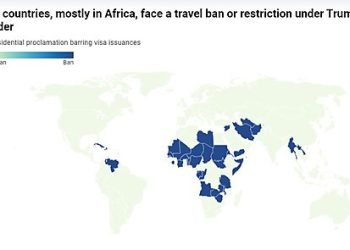The Trump administration has proffered nine universities a deal: Take our rules, and we will give you special access to federal money and “partnerships.” It’s a deal that all the colleges should reject because it would involve selling their souls. And the problem is not that the deal is coming from Donald Trump. Although some aspects of the deal would advance Trump’s priorities, colleges—supposed citadels of free inquiry—should not sell themselves to the government under any administration.
The proposed Compact for Academic Excellence in Higher Education contains ten planks:
Equality in admissions: Schools cannot take group identity into consideration for admissions or student financial support. They must assess applicants based on “widely used” standardized tests or specialized assessments for programs such as music. Finally, schools must “publicly report anonymized data for admitted and rejected students, including GPA, standardized test scores, or other program-specific measures of accomplishments, by race, national origin, and sex.”
Marketplace of ideas and civil discourse: Arguing that “a vibrant marketplace of ideas requires an intellectually open campus environment,” schools must prevent any ideological or political disposition from becoming dominant and specifically commit to “transforming or abolishing institutional units that purposefully punish, belittle, and even spark violence against conservative ideas.” Ideological diversity must be demonstrated institution-wide and “within every field, department, school, and teaching unit.” A university must prevent the “heckler’s veto,” including any sort of “disruptions, violence, intimidation, or vandalism.” Finally, it must “adopt policies prohibiting incitement to violence, including calls for murder or genocide or support for entities designated by the US government as terrorist organizations.”
Nondiscrimination in faculty and administrative hiring: Group identity cannot be used in hiring or employee advancement.
Institutional neutrality: The university, its employees, and all components, such as departments and centers, must be officially neutral on all social and political matters unless they impact the institution. All employees may discuss such matters in their private capacities.
Student learning: Institutions will neither accept grade inflation nor deflation and will publicize grading trends.
Student equality: Schools may not treat students differently based on group identity. Specifies that “women’s equality requires single-sex spaces, such as bathrooms and locker rooms, and fair competition, such as in sports. Institutions commit to defining and otherwise interpreting ‘male,’ ‘female,’ ‘woman,’ and ‘man’ according to reproductive function and biological processes.”
Financial responsibility: Schools must commit to efficiency and freeze tuition charged to American students for five years. Institutions must also “publicly post statistics about average earnings from graduates in each academic program and shall refund tuition to students who drop out during the first academic term of their undergraduate studies.” Schools with endowments above $2 million per undergraduate student cannot charge students in “hard science programs,” with some exceptions for wealthy families. Finally, colleges must accept military education credits.
Foreign entanglements: To prevent money laundering and financing terrorism and to promote overall public accountability, “all universities must comply with anti-money laundering, Know-Your-Customer (‘KYC’), and foreign gift disclosure obligations imposed by the federal government and the rules and regulations overseen by the United States Treasury Department’s Office of Foreign Assets Control and Financial Crimes Enforcement Network (‘FinCen’), the US Department of Justice (‘DOJ’), and the Department of Education (‘ED’).” Schools must also commit to having no more than 15 percent of undergraduates participating in the Student Visa Exchange Program and to no more than 5 percent from any given country. Foreign students must be selected for “extraordinary talent” rather than ability to pay, and they cannot be hostile to the United States. All should be taught American civics.
Exceptions: Religious schools can maintain religious preferences, single-sex institutions can maintain single-sex preferences, and all colleges can maintain preferences for American students.
Enforcement: Institution leaders must annually certify adherence to the compact, and students and employees must be polled annually about adherence, with results publicly available. The Department of Justice would review compliance.
Many of the provisions of the compact might be desirable school policies. There is much to be said for containing costs and tuition, increasing intellectual diversity, putting a lid on grade inflation, and more. But none are absolutely good.
Consider tuition. While there is certainly good reason to believe prices are too high, after-aid prices have actually been declining for the last few years. As Andrew Gillen explained recently, “The net cost to attend a four-year public college fell from around $24,000 in the mid-2010s to around $21,000 in the last few years. Costs to attend community college likewise fell from around $18,000 to around $16,000. Even the cost of attending nonprofit colleges declined from around $39,000 to around $36,000.”
The market seems to be at least somewhat self-correcting, likely in response to growing dissatisfaction with both higher education and big student debt over the last several years. But what if all colleges, or some, needed more money, and the best way to get it was through tuition? One could imagine tuition-dependent colleges, for instance, needing to raise prices to generate sufficient revenue to compete with schools with large endowments. The compact would essentially impose price controls on them.
The compact’s core threat to institutional freedom is the intellectual diversity component, which gets right to what is supposed to be the heart of the academic enterprise: the pursuit of truth. While the ivory tower leans far to the left, the idea of federal authorities being the arbiters of “correct” balance is frightening. Not only could an administration be biased in its judgment of balance, but the evidence in a given field might simply support left-leaning conclusions. If so, balance should not be imposed on it.
Of course, politics is not a simple left-right binary or even a diamond. For instance, we have numerous flavors of conservatism: neocon, paleocon, and natcon. Should Washington ensure that they are all found in the classroom proportionate to their share of the general population? And what if people hold positions that would put them in different camps on different issues, like a libertarian who favors tight borders or a progressive who defends gun rights? Which pile of beans do they go into during intellectual diversity counting?
Other folks, such as Eugene Volokh, have tackled First Amendment issues with the Compact, and I would only highlight that it is very difficult to determine when speech on contentious issues goes from permissibly heated to impermissible “intimidation” or “harassing.” Given such ambiguity, it is much better to let individual institutions make their own, varied judgments—to diffuse the risk of getting it wrong—than to let Washington decide for everyone.
All this said, the compact, which exchanges institutional freedom for federal funding and privileges, is not fundamentally different from the way Washington already exerts power in education. Because the federal government has no constitutional authority to govern in education—education is nowhere among the specific, enumerated powers the Constitution grants to Washington—the feds gain control by attaching rules to funding. The compact is just a more focused form of this unconstitutional tactic.
Of course, if the Constitution gives the feds no power to do something, it makes no sense to say Washington may nonetheless force people to pay taxes and then, to get some money back, require that they follow federal rules in those areas. As James Madison explained in vetoing a bill that would have funded internal improvements such as canals, allowing Congress to spend outside of the specific, enumerated powers would unconstitutionally “leave within the legislative power of Congress all the great and most important measures of Government; money being the ordinary and necessary means of carrying them into execution.”
Unfortunately, judicial precedent has moved away from the obvious understanding that the federal government does not have the authority to bribe states and institutions to do things it cannot directly order them to do. The New Deal era Supreme Court allowed any spending that promotes the “general welfare” or “provides for the common defense,” and South Dakota v. Dole (1987) permitted the federal government to require states to change their laws—in the specific case, make the state drinking age 21—in exchange for money.
Universities should steer clear of the Trump compact because it is highly prescriptive, and they should want to maintain their independence. It would be a ramping up of federal control. But it would be an increase of degree, not of kind. This points us to the more fundamental issue we need to address: the misconception that the federal government can largely dictate what it wants in exchange for money.
That is not how a constitution of enumerated powers works.















